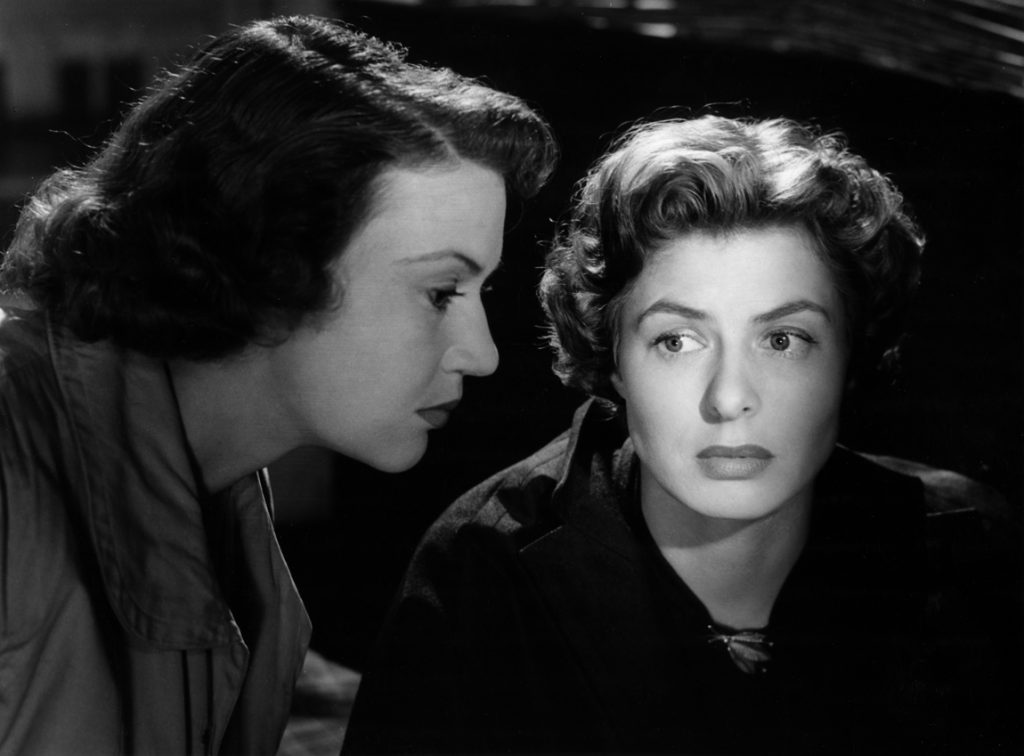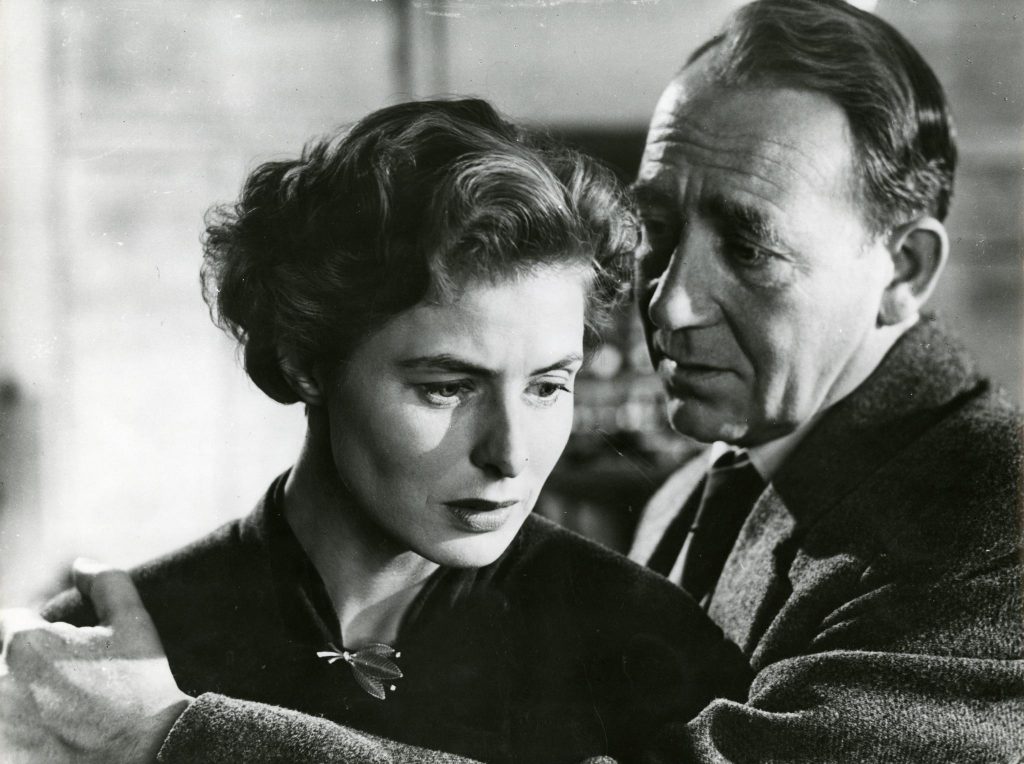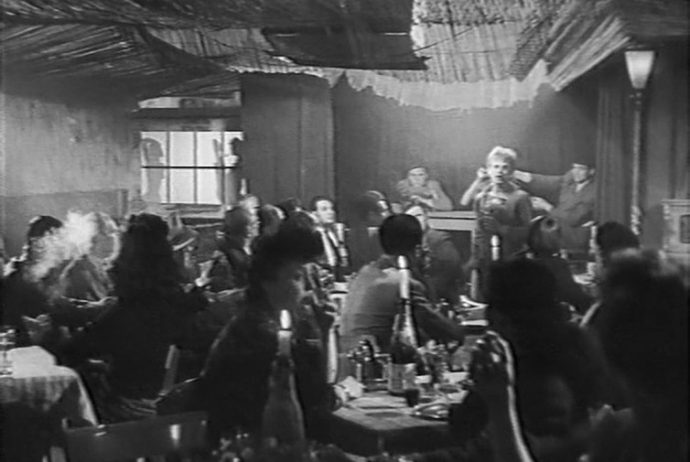Dir: Roberto Rossellini
Star: Ingrid Bergman, Mathias Wieman, Renate Mannhardt, Klaus Kinski
a.k.a. Fear
And this is how the gods of site content punish me. Last month, I was complaining about the brevity of Klaus’s appearance in The Soldier. But I managed to squeeze my usual thousand words out, with the help of a behind-the-scenes interview with the director. So what do they send me next, for my hubris? A film where Kinski’s on screen performance is approximately five seconds in length, I kid you not. His entire appearance is literally GIFable. Yeah, I’m not holding out enormous hope for this hitting the normal quota, but let’s give it the old college try…
Not that it’s without interest, being the final collaboration between Rossellini and then-wife Bergman, before they separated. Their relationship had begun in scandal, with both being married at the time. The affair caused Senator Edwin C. Johnson to denounce them in the US Senate, saying Bergman “had perpetrated an assault upon the institution of marriage,” and was “a powerful influence for evil.” In this light – and that of their eventual break-up – this has a certain resonance. For the story of La Paura is about a woman whose affair, and the threat of its exposure, sends her teetering towards the edge of a breakdown.

There will be spoilers below, in order to discuss the film fully. If you’re concerned about things read no further. Though I had it spoiled for me before I watched it, and I didn’t feel it impacted my enjoyment too much. The way the story-line unfolds, it feels like it could be a Hitchcockian thriller, in which case the twist would probably be more relevant. But it’s really more of a psychological drama, intent on getting inside the head of the lead character, Irene Wagner (Bergman). As such, the revelation is not crucial to an appreciation of it.
The film begins with Irene having an argument with her lover. Curiously, both Wikipedia and IMDb give this character’s name as Erich, but she clearly calls him Heinz at the start. Is this a result of the film having been shot in two versions – German and English – rather than being dubbed from one to the other? I’ve only seen the German version. Adding to the confusion, there may also be multiple cuts. An IMDb review says, “A fishing scene is missing and tiresomely expositional monologue is added in two scenes.” But the fishing was present in what I saw, and there was no Blade Runner-esque monologue to be found.
I digress. Heinz/Erich is annoyed at the lack of time Irene spends with him these days. While the film certainly doesn’t make this clear, other reviews state that the affair began while her scientist husband, Albert (Wieman), was away in prison following the end of the war, but has since gone on the back-burner. Irene gets door-stepped one night by Johanna Schultze (Mannhardt). She explains she was a former girlfriend of Erich, and threatens to reveal Irene’s relationship with him to her husband, unless she gets paid. First, she asks for five thousand marks, and eventually it escalates to twenty thousand.

However, the twist is that the scheme is actually instigated by Albert. He wants his wife to confess in order that he can forgive her. This motivation is made clear during a scene at the family’s country house, where the son and daughter have been packed off for the summer. The boy gets an air-rifle as a present, but the girl is jealous, so hides it. Initially, she won’t confess to what she has done, but her father delivers the following lines to her – though they resonate both with the audience and Irene. Given Albert’s role, it’s likely his choice of words is entirely deliberate.
I know that in a moment of confusion or of anger one can make a mistake, but we must have the courage to admit we were wrong. If we are honest people… All of us love you. That’s why it hurts us. It’s not so much what you’ve done that matters. We could forgive you for that. But it’s because you are so obstinate in your denials.
But rather than confess, Irene’s mental state spirals down as the weight of her actions hangs heavily on her soul. A meeting with Johanna is arranged at the ‘Kleine Fische’ bar, which apparently doubles as a beat poetry venue. And that’s where Klaus makes his brief appearance, as he is reciting a poem as Irene enters, being briefly glimpsed – you can’t miss that wild shock of blond hair. Here’s his footage, in all its glory.
For what it’s worth, his lines translate as:
Where they sit on their fists like a heavyweight,
on their tower of law and burn beside their smiles…
Make of that what you will.
Johanna ends up confessing she was put up to the blackmail stunt by Irene’s husband, a revelation which sends the victim even further into despair. She is about to attempt suicide – and I have to say, it’s a very powerful scene, showcasing Bergman at her most intense – when her husband arrives and stops her, forgiving her even without the desired confession. Though I’m not sure she could, or will, forgive him for putting her through the emotional wringer.
Hey, whaddya know. I still reached a thousand words, though for obvious reasons, not much about KK! There is a small chunk in All You Need is Love, which refers to Rossellini, though it’s not clear if it’s in regard to this film. Klaus writes:
Roberto Rossellini comes to Berlin to cast his next movie. Count Treuberg, whom I met through Sasha and who is supposedly Rossellini’s consultant and is always meddling and lying, takes me to him. The waiting room in the production office is stuffed with unemployed actors who are all desperate to play in Rossellini’s film. Rossellini is on the telephone with Anna Magnani in Rome and has apparently forgotten, or doesn’t even know, that we are all here. After four hours of hanging out in the smoke-filled room, I am ripping mad. I roar out, cursing Rossellini and his fucking movie. Rossellini throws the door open, gives me a friendly laugh and says to Treuberg, “Chi έ quello? Mi interessa! Fategli un provo.”
The last sentence translates, from what I can work out, to “Who is that? I’m interested! Give him a shot.” But if all that resulted was the five seconds here, can’t say I blame Kinski for being mad!
